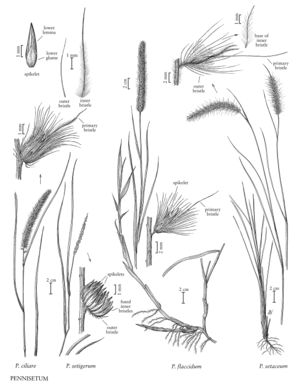Difference between revisions of "Pennisetum setaceum"
imported>Volume Importer |
imported>Volume Importer |
||
| Line 47: | Line 47: | ||
|publication year= | |publication year= | ||
|special status=Introduced | |special status=Introduced | ||
| − | |source xml=https:// | + | |source xml=https://bitbucket.org/aafc-mbb/fna-data-curation/src/2e0870ddd59836b60bcf96646a41e87ea5a5943a/coarse_grained_fna_xml/V25/V25_1366.xml |
|subfamily=Poaceae subfam. Panicoideae | |subfamily=Poaceae subfam. Panicoideae | ||
|tribe=Poaceae tribe Paniceae | |tribe=Poaceae tribe Paniceae | ||
Revision as of 21:02, 5 November 2020
Plants perennial, or annual in temperate climates; cespitose. Culms 40-150 cm, erect, pubescent beneath the panicle; nodes glabrous. Leaves green, sometimes glaucous; sheaths glabrous, margins ciliate; ligules 0.5-1.1 mm; blades 20-65 cm long, 2-3.5 mm wide, convolute or folded, scabrous, midvein noticeably thickened. Panicles (6)8-32 cm long, 40-52 mm wide, erect or arching, pink to dark burgundy; rachises pubescent. Fascicles 8-10 per cm; fascicle axes 2.3-4.5 mm, with 1-4 spikelets; outer bristles 28-65, 0.9-19 mm; inner bristles 8-16, 8-27 mm, ciliate; primary bristles 26.5-34.3 mm, ciliate, noticeably longer than the other bristles. Spikelets 4.5-7 mm, sessile or pedicellate; pedicels to 0.1 mm; lower glumes absent or to 0.3 mm, veinless; upper glumes 1.2-3.6 mm, (0)1-veined; lower florets usually sterile, sometimes staminate; lower lemmas 4-6 mm, 3-veined, acuminate, midvein excurrent to 0.7 mm; lower paleas usually absent, if present, to 4.4 mm; anthers absent or 2.3-2.4 mm; upper lemmas 4.5-6.7 mm, attenuate, 5-veined, midvein excurrent to 0.7 mm, margins glabrous; anthers 2.1-2.7 mm. 2n = 27.
Distribution
Colo., N.Mex., La., Calif., Tenn., Pacific Islands (Hawaii), Ky., Ariz., Fla., Oreg.
Discussion
Pennisetum setaceum is a desert grass native to the eastern Mediterranean region. It is a popular ornamental throughout the southern United States, but it is also an invasive weed.
Selected References
None.
